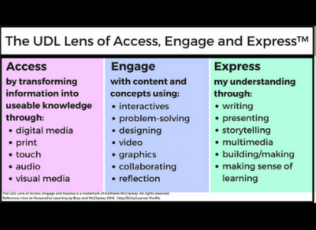
Empower Learners With the UDL Lens
In this session you will discover how a special education case manager implemented the Learner Profile using the UDL Lens with her high school learners so that they could share their strengths and challenges in their learning that in turn empowered them to become advocates for their learning goals by leading their own IEP meetings.
Session Video Recording
Resources
Learner Profile
Personal Learning Backpack
Interactive Notes Document
Share this resource:
Posted date:
November 24, 2020

